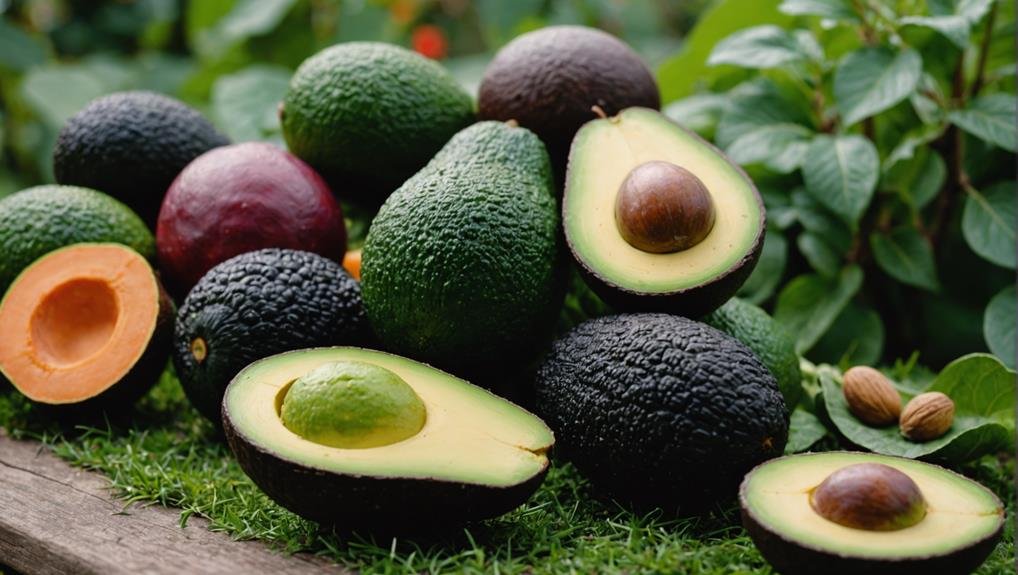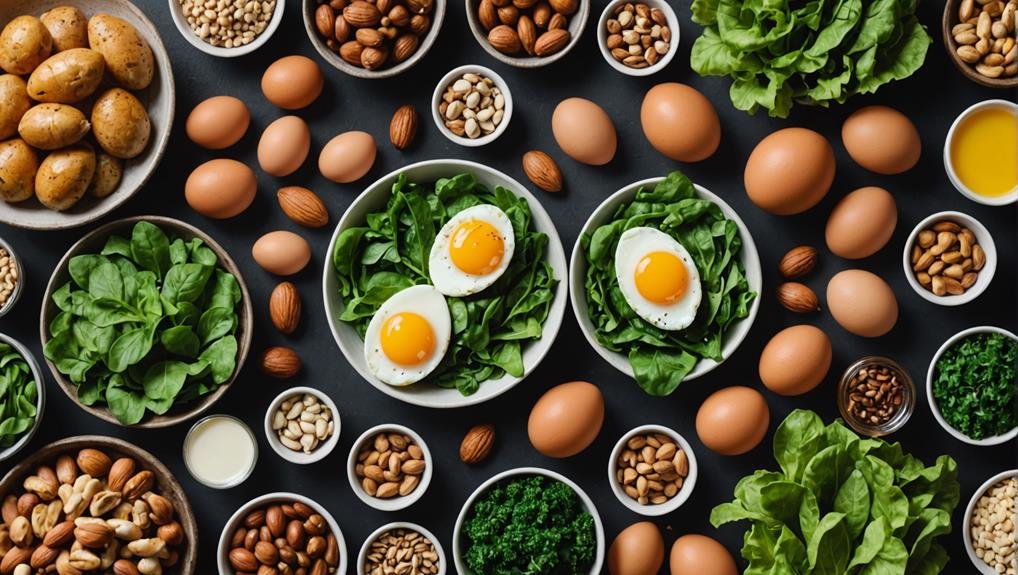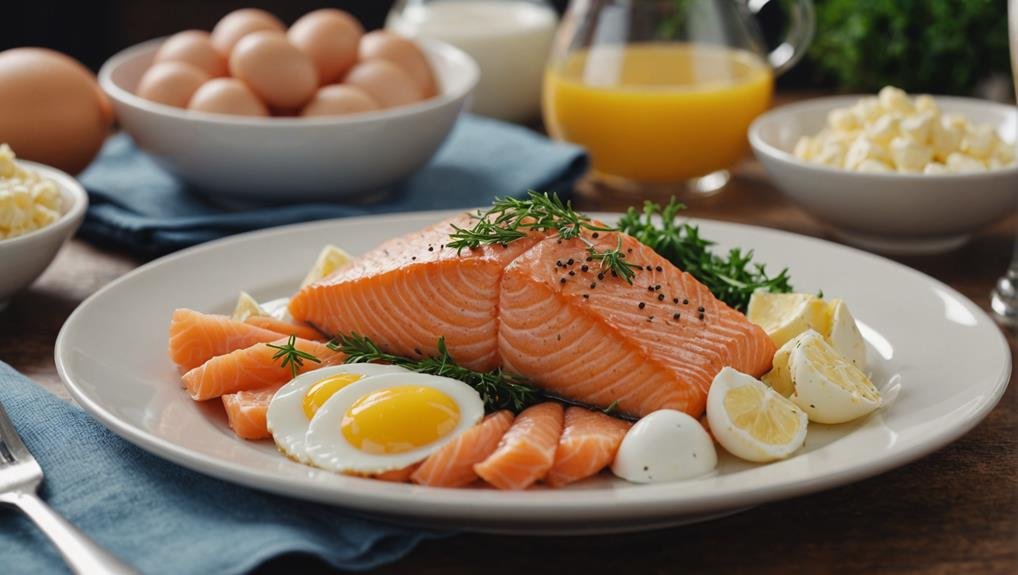Best Vitamins for Healthy Skin and Hair#COMMA
When it comes to achieving healthy skin and hair, the right vitamins can make a significant difference. From Vitamin C's collagen-boosting properties to the antioxidant benefits of Vitamin E, each vitamin plays a crucial role in maintaining your skin and hair's health. But which ones are truly the best for your skin and hair? Let's explore the top contenders and how they can transform your beauty routine.
Key Takeaways
- Vitamin C enhances skin radiance and hair strength through collagen production.
- Vitamin E protects skin from free radicals, UV damage, and promotes skin hydration.
- Biotin aids in healthy hair growth, promoting keratin production for stronger hair.
- Vitamin A stimulates collagen, repairs skin, and reduces signs of aging.
Vitamin C Benefits

Enhance your skin's radiance and hair's strength with the powerful antioxidant properties of Vitamin C. This essential nutrient plays a crucial role in collagen production, the protein responsible for maintaining skin's elasticity and hair's structural integrity. By incorporating Vitamin C into your skincare and haircare routine, you can support the body's natural collagen synthesis process, leading to firmer skin and healthier hair.
Apart from its role in collagen production, Vitamin C offers remarkable antioxidant benefits. As an antioxidant, Vitamin C helps protect the skin and hair from free radical damage caused by environmental stressors like UV radiation and pollution. By neutralizing these free radicals, Vitamin C aids in preventing premature aging signs such as wrinkles, fine lines, and dullness, promoting a youthful and vibrant appearance.
Including Vitamin C-rich foods in your diet or using skincare products formulated with Vitamin C can significantly benefit your skin and hair health, offering a natural and effective way to enhance your beauty regimen.
Vitamin E for Skin
Incorporating Vitamin E into your skincare routine can provide numerous benefits for your skin's health and appearance. Vitamin E is a powerful antioxidant that helps protect your skin from damage caused by free radicals and UV radiation. This vitamin is known for its moisturizing properties, helping to keep your skin hydrated and supple.
Additionally, Vitamin E can assist in reducing inflammation, promoting wound healing, and even helping to prevent signs of aging such as wrinkles and fine lines.
To incorporate Vitamin E into your skin care routine, you can use products that contain this vitamin, such as serums, creams, or oils. Alternatively, consuming foods rich in Vitamin E, like almonds, spinach, and sunflower seeds, can also support your skin's health from the inside out.
Biotin for Hair Growth

For promoting healthy hair growth and maintenance, considering the benefits of Biotin supplementation can be valuable. Biotin, also known as Vitamin B7, plays a crucial role in the health of your hair.
Biotin supplements are often recommended for individuals experiencing hair thinning or loss. This vitamin aids in the production of keratin, a protein that makes up your hair strands, promoting stronger and healthier hair growth.
In addition to supplements, incorporating Biotin-rich foods into your diet can also support hair health. Foods like eggs, nuts, seeds, and sweet potatoes are excellent sources of Biotin. Including these foods in your meals can help ensure you're getting an adequate amount of this essential vitamin to promote optimal hair growth.
Vitamin A for Radiance
Consider adding Vitamin A to your skincare routine for a radiant complexion and healthy skin. Vitamin A plays a crucial role in skin repair and maintenance, making it a valuable addition to your beauty regimen.
Here are four ways in which Vitamin A can benefit your skin:
- Vitamin A for Skin Repair: Vitamin A aids in the repair and maintenance of skin tissues, promoting a smoother and more even complexion.
- Vitamin A for Acne: Vitamin A's anti-inflammatory properties help combat acne by reducing redness and swelling, leading to clearer skin over time.
- Vitamin A for Anti-Aging: By stimulating collagen production, Vitamin A can help reduce the appearance of fine lines and wrinkles, promoting a more youthful-looking complexion.
- Vitamin A for Dark Spots: Vitamin A's ability to promote cell turnover can help fade dark spots and hyperpigmentation, resulting in a more even skin tone.
Incorporating Vitamin A into your skincare routine can help you achieve a glowing complexion while addressing common skin concerns like acne, signs of aging, and dark spots.
Vitamin D and Hair Health

Explore the role of Vitamin D in maintaining healthy hair and promoting optimal hair growth.
Vitamin D plays a crucial part in the hair growth cycle, as it helps in creating new hair follicles and maintaining existing ones. Adequate sun exposure is a natural way for your body to produce Vitamin D, which in turn can support healthy hair growth. However, it's essential to balance sun exposure to avoid skin damage and reduce the risk of skin cancer.
In addition to sun exposure, incorporating dietary sources rich in Vitamin D can also benefit your hair health. Foods like fatty fish, fortified dairy products, and egg yolks are excellent sources of Vitamin D that can contribute to maintaining strong and vibrant hair.
Vitamin D deficiency has been linked to hair loss and thinning, emphasizing the importance of ensuring sufficient levels of this essential vitamin in your body for optimal hair health. Be mindful of your sun exposure and dietary intake to support your hair growth and overall well-being.
Vitamin K for Skin Elasticity
Vitamin K plays a key role in maintaining skin elasticity by supporting the body's natural processes of collagen production and skin repair. This vital nutrient contributes to skin firmness and helps in the prevention of sagging, allowing you to age gracefully with skin that retains its youthful appearance.
Here are four reasons why incorporating Vitamin K into your skincare routine can benefit your skin:
- Collagen Production: Vitamin K aids in the synthesis of collagen, a protein crucial for maintaining skin structure and elasticity.
- Skin Repair: By promoting proper blood clotting, Vitamin K supports the healing of wounds and skin damage, enhancing overall skin health.
- Anti-Aging Properties: Its ability to improve skin elasticity helps reduce the appearance of fine lines and wrinkles, supporting a more youthful complexion.
- Dark Circles: Vitamin K can also help diminish the appearance of dark circles under the eyes, contributing to a brighter and rejuvenated look.
Zinc for Healthy Scalp

Zinc plays a crucial role in maintaining a healthy scalp by supporting various functions essential for optimal hair growth and overall scalp health. This essential mineral is involved in processes that promote the health of hair follicles and the scalp. Zinc aids in regulating sebum production, which helps prevent dandruff and supports the scalp's natural moisture balance. Furthermore, zinc is crucial for the absorption of other nutrients that are vital for hair health, such as vitamins A and E.
When it comes to scalp health, ensuring proper zinc levels is key. Zinc deficiency can lead to a variety of scalp issues, including dryness, flakiness, and even hair loss. By incorporating zinc-rich foods like oysters, nuts, seeds, and legumes into your diet, you can support optimal zinc absorption and promote a healthy scalp environment.
Additionally, zinc supplements can be beneficial for individuals with zinc deficiencies or those looking to enhance their scalp health. Remember, a balanced diet rich in essential nutrients, including zinc, is fundamental for maintaining a healthy scalp and promoting robust hair growth.
Iron and Hair Loss
Maintaining adequate iron levels is crucial for preventing hair loss and promoting healthy hair growth. Iron deficiency can lead to hair thinning and even hair loss.
Here are some key points to consider regarding iron and its impact on hair health:
- Iron and Hair Growth: Iron is essential for the proper growth and development of hair follicles. Without enough iron, the hair growth cycle can be disrupted, leading to hair thinning and shedding.
- Symptoms of Iron Deficiency: Pay attention to signs of iron deficiency such as fatigue, pale skin, and brittle nails, as these may indicate a lack of iron which could be contributing to hair loss.
- Iron-Rich Foods: Incorporate iron-rich foods into your diet such as lean meats, seafood, spinach, lentils, and fortified cereals to help maintain optimal iron levels and support healthy hair growth.
- Consultation with a Healthcare Provider: If you suspect iron deficiency is contributing to your hair thinning, consult with a healthcare provider to determine the best course of action, which may include iron supplementation or dietary adjustments.
Vitamin B Complex Overview

Including a variety of B vitamins in your diet is crucial for supporting overall skin and hair health. The B vitamin complex consists of eight essential nutrients, including B1 (thiamine), B2 (riboflavin), B3 (niacin), B5 (pantothenic acid), B6 (pyridoxine), B7 (biotin), B9 (folate), and B12 (cobalamin). These vitamins play a vital role in maintaining the health of your skin and hair by supporting cell growth, repair, and regeneration.
B vitamins are known to help in stress management, as they play a key role in the production of stress hormones like adrenaline. Adequate levels of B vitamins can also contribute to a balanced mood and overall well-being. Incorporating foods rich in B vitamins into your diet can help ensure you maintain optimal levels of these nutrients.
To promote healthy skin and hair, focus on a diet balanced in B vitamin-rich foods such as whole grains, lean proteins, nuts, seeds, and leafy greens. Ensuring you have enough B vitamins in your diet can support your body in managing stress and maintaining overall skin and hair health.
Omega-3 Fatty Acids for Skin
Incorporating omega-3 fatty acids into your diet can significantly benefit the health and appearance of your skin. These essential fatty acids play a crucial role in maintaining skin hydration and overall skin health.
Here's why you should consider adding fish oil or flaxseed oil to your daily routine:
- Fish Oil Benefits: Rich in omega-3 fatty acids, fish oil can help improve skin hydration from within, giving you a radiant and supple complexion.
- Anti-Inflammatory Properties: Flaxseed oil, another excellent source of omega-3s, possesses potent anti-inflammatory properties that can help reduce redness and inflammation in the skin.
- Enhanced Skin Barrier Function: Omega-3 fatty acids support the skin's natural barrier function, protecting it from environmental stressors and preventing moisture loss.
- Reduced Acne: By reducing inflammation and regulating oil production, omega-3 fatty acids can also help in managing acne breakouts, promoting clearer skin.
Vitamin B12 for Hair

Vitamin B12 plays a crucial role in promoting healthy hair growth and overall hair health. This essential vitamin is vital for maintaining hair thickness and preventing hair loss. A deficiency in vitamin B12 can lead to hair problems such as excessive shedding, slow hair growth, and even premature graying.
If you're experiencing hair issues like thinning or lackluster hair, it might be worth considering your vitamin B12 levels. Adding foods rich in vitamin B12, such as meat, fish, dairy, and fortified cereals, can be a great way to boost your intake naturally.
However, sometimes diet alone may not be sufficient, especially for individuals with absorption issues or strict dietary restrictions. In such cases, B12 supplementation under the guidance of a healthcare provider can be beneficial.
Selenium for Skin Protection
To further enhance your skin health, consider the importance of selenium in providing protection and nourishment to your skin cells. Selenium is a vital mineral that offers numerous benefits for both skin protection and hair growth.
Here's why selenium is a must-have in your skincare routine:
- Antioxidant Properties: Selenium acts as an antioxidant, helping to protect your skin from damage caused by free radicals and UV radiation.
- Skin Elasticity: Selenium aids in maintaining the elasticity of your skin, promoting a youthful appearance and reducing the signs of aging.
- Wound Healing: This mineral plays a crucial role in the healing process of wounds, ensuring your skin recovers effectively.
- Hair Growth: Selenium is essential for maintaining a healthy scalp and promoting hair growth, potentially reducing dandruff and hair loss.
Incorporating selenium-rich foods like Brazil nuts, sunflower seeds, and fish into your diet can help you harness the skin-protecting and hair-nourishing benefits of this essential mineral.
Frequently Asked Questions
Can Vitamins Replace a Healthy Diet for Skin and Hair?
Maintaining a nutritional balance is key for healthy skin and hair. While vitamins can complement a diet, they cannot replace it entirely. Supplements may be necessary, but whole foods provide essential nutrients your body craves.
Are There Any Side Effects of Consuming Too Many Vitamins?
When it comes to vitamin consumption, too much can lead to vitamin toxicity risks, potentially causing skin reactions. It's crucial to maintain balance in your intake to avoid unwanted side effects on your health.
Can Vitamins Prevent Premature Graying of Hair?
To prevent premature graying of hair naturally, consider incorporating vitamins like biotin. Biotin, a B-vitamin, is known for its benefits in promoting healthy hair growth and potentially delaying the graying process.
How Long Does It Take to See Results From Vitamin Supplements?
You should start noticing improvements in hair growth and skin elasticity within 2 to 3 months of consistent vitamin supplement use. Results vary based on individual health factors and the specific vitamins taken.
Can Vitamins Help With Skin Conditions Like Acne or Eczema?
Vitamin deficiencies can contribute to skin conditions like acne or eczema. Proper supplementation can help improve skin hydration and overall health. Studies show that addressing these deficiencies may lead to clearer, healthier skin.
Conclusion
In conclusion, incorporating essential vitamins into your diet is crucial for maintaining healthy skin and hair.
While some may argue that getting enough vitamins solely from food is sufficient, supplementing with vitamins can provide additional support for optimal skin and hair health.
By prioritizing a balanced intake of key vitamins like C, E, biotin, A, D, and K, you can achieve radiant skin and strong, vibrant hair.
Remember, taking care of your skin and hair from the inside out is key to overall wellness.




